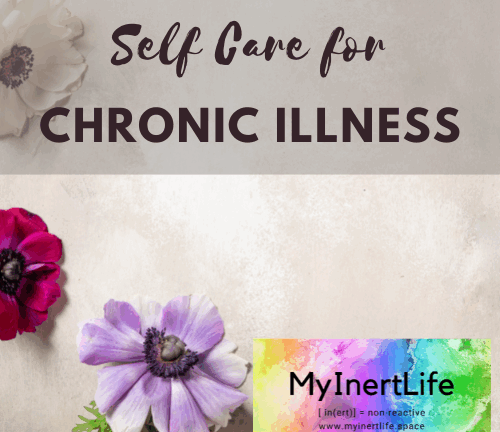This post provides tips for practicing radical self-care for chronic illness. Taking care of yourself is critical whenever you are in a role where you give of your own energy, such as parenting, caregiving, or working in a helping profession. And this includes being your own caregiver when you have a chronic illness. Being sick takes tremendous energy, and it can often feel like you don’t have the energy to take care of yourself, let alone add in self-care.
As an Amazon Associate, I earn from qualifying purchases.
Table of Contents
Radical Self-Care is the term I coined after Cheri Huber’s audio program called Radical Self-Acceptance. Huber’s term “radical” speaks to the need to go outside the societal norms, giving importance to something when it isn’t intuitive or given social credence.
https://www.pinterest.com/pin/1054475700229906717/Self-care for chronic illness – practices for survival
Self-care practices need to fill you up. If you find yourself in a caring position, or if you are going through an intense chapter in your life, look at your self-care needs as “musts.” Do you need alone time? By getting up an hour earlier than others in your household or staying up a little bit later, you might carve out that time alone. Do you need physical contact? Find a way to ask for hugs or schedule regular bodywork for yourself. Are you physically exhausted and need to take a nap every day? Set up a break in your day to accommodate a nap, whether that involves hiring a babysitter or respite caregiver, arranging your lunch break during your workday when you can rest interrupted (even under your desk!), or go out to your car for twenty minutes each afternoon.
Self-care for chronic illness – create a routine
Here is a partial list of some ideas for Radical Self-Care to use as a starting point to create your own daily Radical Self-Care routine:
- Spend time in nature
- Do gentle or restorative yoga
- Talk a walk
- Use essential oils for energetic balancing
- Say “no” when necessary, and don’t feel guilty
- Take a bath or a foot bath
- Have a sauna
- Make sure you’ve had enough protein
- Sing in the shower, in your car, or listen to your favorite music
- Take ten deep breaths before eating each meal to initiate the parasympathetic response
- Draw, color, paint, make a collage, play with clay
- Keep a budget – with a line item for personal/self-care – I recommend the program YNAB
- Get a massage, shiatsu, or acupuncture
- Meditate
- Walk a labyrinth
- Use natural stress-relieving aids like CBD oil, essential oils, melatonin for sleep or herbs for emotional balance
- Laugh – watch funny videos, seek out joy
- Eat healthy foods
- Have a cup of tea
- Talk to a counselor or trusted advisor
- Connect with your significant other or a close friend
- Limit your screen time
- Read a book
- Take part in a spiritual practice
- Get a facial, manicure, or pedicure
- Avoid toxic people
- Take a nap
- Sew, quilt, knit, or crochet
- Think of something you are grateful for
- Intentionally schedule “me” time on your calendar
- Listen to a podcast
- Unplug from social media for an hour, a day, or a week
- Clean one room in your house
- Wear colors that make you feel good
- Journal
- Start a forgiveness practice
- Allow yourself to feel your feelings in real-time
- Cultivate self-love
- Ask a friend to tell you three things that they like about you
- Learn mindfulness
- Read feel-good poetry (try Rumi or Hafiz)
- Keep a box filled with thank you cards and affirming notes you have received from others as reminders of the love you share in the world
- Volunteer or give to a cause that matters to you
- Find out whether you are an introvert or an extrovert and make choices based on that information
- Tidy your bedroom
- Post inspiring quotes or affirmations on your mirror
- Drink more water
- Stretch
- Spend 10 minutes in the sun
- Pet your dog or cat
- Self-soothe when you are upset – eg., Stroke your arm or give yourself a hug
- Go on a solo retreat
- Cook or bake
- Plant something
- Eat your favorite comfort foods
- Buy yourself flowers
- Get rid of or replace clothing that doesn’t fit, or you don’t like
- Hire someone to do something you don’t have time for or trade skills
- Light candles
- Treat yourself to a small luxury
- Give yourself a hand or foot massage
- Drink hot cocoa
- Put up fairy lights
- Watch clouds
- Ask for help
- Have a picnic
- Have a game night
- Smile
- Take a road trip
- Do a 10-minute body scan
- Pray
Self-care for chronic illness – consider your lifestyle limitations
Your Radical Self-Care routine needs to fit with your lifestyle, your resources, the limitations of your illness, and the demands on your time.
- Think about which of your existing self-care practices bring you joy/peace/happiness and if you can expand those or create new practices with the elements of those practices that work with your life.
- Next, consider if there is there a way to improve upon or even drop any of your existing self-care practices that don’t increase your well-being. Can you add music, a friend, a flavor, an app, change the time of day, etc.?
- Then, ask yourself which practices you would like to integrate into your life because it would increase your well-being. Ponder: What is necessary to make it happen? What is realistic? What outside support might you need?
Get my free recipe ebook, symptom log, and 2-week meal plan!
Sign up for my newsletter and you will receive my free 50-page ebook of lower-histamine, grain-free, sugar-free, Keto recipes, my free symptom log, and a free two-week meal plan!
Self-care for chronic illness – make it part of your daily routine
I’ve talked about the benefit of having a daily routine when you have MCAS or other chronic illnesses in this post. Once you’ve committed to doing Radical Self-Care it helps to create the infrastructure so that it can happen regularly. Here are some tips for doing that:
- Bookend your day with self-care practices that feed your soul so that you open and close your day by doing things that create a rhythm to your day. Your morning self-care routine can help prepare you for your day, such as meditation, yoga, movement or exercise, reading, walking the dog, etc. Evening self-care routines can aid in winding down and preparing for sleep, such as taking a bath, meditation, listening to music, praying, lighting candles, having a cup of tea, etc.
- Allow for flexibility in your self-care routines. Whenever possible, do them. When it’s not possible, or out of your control, try to do one self-care element, or don’t sweat it.
- Try to limit your consumption of sugar, controlled substances, and screen time to other times, so that self-care is purely focused on nurturing your wholeness and being present with yourself.
- Radical Self-Care is about nurturing and supporting yourself to function at your best. It’s not a contest. It’s not about what you “should” do.
- Set up a self-care station in your home with items that will remind you of the desire to self-nurture. For instance, have a cozy blanket, cushions, chocolate, candles, yoga mat, music speaker, book, knitting, art supplies, or other items there to make your self-care station comfortable and inviting.
Check out these circadian health tools!
I’m an affiliate with Bon Charge, a company that makes tools for circadian health, and you can receive 15% off your order with my coupon code BETSYL.
Bon Charge offers tools such as yellow and red-tone blue-blocking glasses, red light therapy devices, PEMF mats, infrared saunas, and EMF blocking products.
Sign up for the SSP!
If you are dealing with chronic illness, concussions, or trauma, the Safe and Sound Protocol (SSP) is a listening therapy based on Polyvagal Theory that helps heal nervous system dysregulation. Many people with MCAS and other chronic conditions have nervous system dysregulation stemming from infections, toxic exposures, concussions, and trauma. The SSP is an easy-to-use app where you listen to specially filtered music for 30 minutes each day for a 5-hour cycle. Studies show the SSP has a profound effect on mental health and chronic conditions
You can sign up for the SSP here!
Heal your mind!
While the SSP is a bottom-up or somatic therapy for healing the nervous system, the Sacred Self-Healing Method I offer is a top-down nervous system healing modality that focuses on cognition, attention, perception, and emotion, using the mind’s higher functions. The SSP and the Sacred Self-Healing Method complement each other and together produce lasting results.
I provide one-on-one in-person and remote chronic illness and caregiver coaching and Sacred Self-Healing Sessions based on the Sacred Self-Healing Method, a proven novel co-creative healing modality detailed in my Books.
Click here for more information.
Order my books!
Rocks and Roots chronicles my journey solo backpacking the Superior Hiking Trail and overcoming nervous system dysregulation, gut dysbiosis, and Mast Cell Activation Syndrome symptoms to hike 328 miles successfully.
The Sacred Self-Healing Method ebook is available here and in most ebook retailers!
The Sacred Self-Healing Workbook is available for purchase here!
Betsy’s first book, Sacred Self-Healing: Finding Peace Through Forgiveness, is available here
Companion Recordings
The companion audio recordings of chants, guided meditations, and sound healing demonstrations that accompany Sacred Self-Healing: Finding Peace Through Forgiveness are available to download for free here
What do you think?
I’d love to have your reply below!
Disclaimer
The preceding material does not constitute medical advice. This information is for information purposes only and is not intended to be a substitute for professional medical advice, diagnosis, cure or treatment. Always seek advice from your medical doctor.



